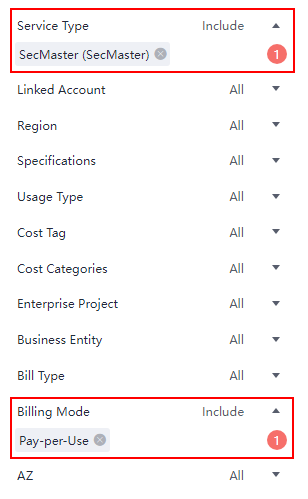Cost Management
As more and more enterprises move workloads to the cloud, cloud costs are drawing more attention. How to manage costs and reduce service loads when using SecMaster is also our concerns. The following describes how to manage costs from four dimensions: cost composition, allocation, analysis, and optimization, to help maximize return on your investment.
Cost Composition
When using SecMaster, you will use some resources, which depend on billing items of SecMaster you are using. For details, see Billing Items.
Cost Allocation
A good cost accountability system is the basis of cloud financial management. It ensures that departments, business teams, and owners are accountable for their respective cloud costs. Allocate costs to different teams or projects so that organizations have a clear picture of their respective costs.
We provide multiple tools for you to optimize cost allocation in Cost Center.
- Allocate costs by linked account.
The enterprise master account can categorize the costs of its member accounts by linked account to manage the accounting of those member accounts. For details, see Viewing Costs by Linked Account.
- Allocate costs by cost category.
You can use Cost Categories in Cost Center to split shared costs. Shared costs include the costs for the resources (compute, network, storage, or resource packages) shared across multiple departments or the costs that cannot be directly split by cost tag or enterprise project configured for the resources. These costs are not directly attributable to a singular owner, and hence cannot be categorized into a singular cost category. In this case, you can define cost splitting rules to fairly allocate these costs among teams or business units. For details, see Viewing Cost by Cost Category.
Cost Analysis
To accurately control and optimize your costs, you need a clear understanding of what parts of your enterprise incurred different costs. Cost Center visualizes original costs and amortized costs in various dimensions and through filters so that you can analyze service usage costs, trends, and factors from a variety of perspectives and scopes.
You can also use Cost Anomaly Detection in Cost Center to detect unexpected expenses in a timely manner. In this way, costs can be monitored, analyzed, and traced.
For details, see Performing Cost Analysis to Explore Costs and Usage and Enabling Cost Anomaly Detection to Identify Anomalies.
Cost Optimization
- Cost control
You can create different types of budgets on the Budgets page of Cost Center to track your costs against the budgeted amount you specified and send alerts to the recipients you configured if the thresholds you defined are reached. You can also create budget reports and we will periodically generate and send to the recipients you configured on a schedule you set.
For example, an enterprise needs to create a monthly cost budget for SecMaster. The monthly budget is $2,000 USD. The system should send an alarm when the forecast amount is greater than 80% of the budget amount. Then, the created budget is as follows:
Figure 1 Basic budget information Figure 2 Budget Scope
Figure 2 Budget Scope Figure 3 Budget alerts
Figure 3 Budget alerts
- Resource optimization
Cost Center can help monitor the historical expenditures and resource usage of SecMaster, identify idle resources, and provide optimization suggestions so that you can reduce costs as much as possible.
- Billing mode selection
Different types of services have different requirements on resource usage periods and therefore require different billing modes to achieve the optimal outcome.
- For long-term stable mature services, yearly/monthly billing mode is recommended.
- For short-term, unpredictable services that experience traffic bursts and cannot be interrupted, pay-per-use billing is recommended.
Feedback
Was this page helpful?
Provide feedbackThank you very much for your feedback. We will continue working to improve the documentation.See the reply and handling status in My Cloud VOC.
For any further questions, feel free to contact us through the chatbot.
Chatbot





